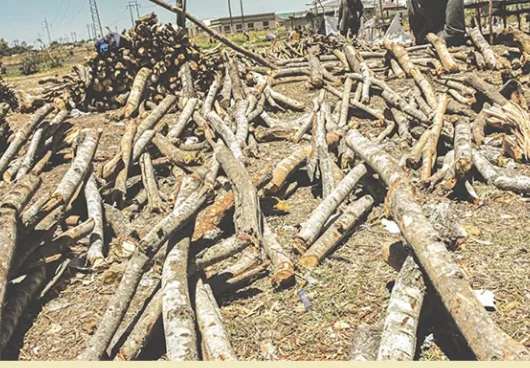|
Getting your Trinity Audio player ready...
|
Clayton Masekesa
With furtive glances over his shoulder, Samson Muchibo (not his real name), the firewood poacher, creeps through the Burma Valley forest in Mutare South constituency, his worn axe slung over his shoulder.
He knows the Zimbabwe Republic Police, Environmental Management Agency (EMA), and Zimbabwe Forestry Commission authorities are on the lookout for him, but the promise of a quick profit is too great to resist.
Spotting a sturdy tree, Muchibo swiftly assesses its value, his eyes scanning the trunk for the perfect cut.
With a few swift swings of his axe, the tree crashes to the ground, its branches splintering into the underbrush.
As the sun begins to set, casting long shadows across the forest floor, the firewood poacher gathers his bounty, his arms straining under the weight of the freshly cut wood. He knows he will sell it on the black market, no questions asked, and the money will be good.
But for now, Muchibo must hide, concealing his spoils in a secret cache, waiting for nightfall to make his escape.
Muchibo is not alone.
Amidst the deepening electricity crisis in Zimbabwe, a new wave of environmental destruction is sweeping across the country.
Firewood poachers, driven by demand for alternative energy sources, are cutting down trees at an alarming rate, leaving a trail of devastation in their wake.
As the power grid struggles to keep up with demand, the once-lush woodlands and forests are being ravaged, threatening the very foundations of the country’s ecosystem.
“I have been doing this ever since the electricity crisis started. I have to provide for my family, you know? I sneak into the forest at night, avoiding the rangers and police. I know the forest like the back of my hand, so I can move quickly and quietly. I cut down the trees, mostly Mopani or msasa, and chop them into manageable pieces. I load them onto my truck and head to the black market,” said Muchibo.
“Firewood is in high demand as we speak because of the load shedding. So some need firewood for their businesses and domestic use. They do not ask questions, and I do not tell them where they come from. It is a lucrative business, but it is risky. If I get caught, I will face fines or even jail time,” Muchibo said.
Elsewhere in Vumba forests, the sound of chainsaws and axes echoes through the woodlands, poachers are putting the country’s biodiversity at risk, clearing vast swathes of forest to fuel the black market demand for firewood.
“But what choice do I have? The economy is tough, and this is the only way I can make a living. I have seen others doing it too, so I know I am not the only one. We are just trying to survive,” said another poacher in Vumba.
“I know it is not sustainable, and it is harming the environment. But what can I do? I need to feed my family. Maybe one day, things will get better and we will have enough electricity for everyone. Until then, I will keep doing what I have to do.”
But, the Zimbabwe police and stakeholders have been hard on the poachers.
There has been a robust cat-and-mouse relationship, as the authorities fight to bust up the firewood poachers.
ZRP Mutare Member-In-Charge (Operations), Inspector Givemore Mushangwe, said the police have been doing joint operations with stakeholders to stop the poaching of firewood.
“As police, we have been doing intensive joint operations with our stakeholders to stop the poaching of firewood,” he said.
“We are deploying officers and doing patrols in the areas where deforestation is taking place. We will then do investigations and arrest those found on the wrong side of the law,” said Mushangwe.
“We are also engaging with the community by doing campaigns and awareness programmes on environmental crimes,” he said.
The Manicaland Provincial Forestry Commission Extension Manager, Phillip Tom, said the Commission has come up with deterrent fines for firewood poachers.
“Yes with the economic crisis, people are trying to eke out a living by poaching firewood. But, as Forestry Commission, we are saying no to this because forests are part of our environment. While some people want to make money, there is a great need to protect the environment,” he said.
“We have imposed deterrent fines to the offending poachers. The fines range from US$2000 up to US$3000 depending on the scale or quantity of the firewood,” said Tom.
“As we talk, we have confiscated trucks and loads of firewood poachers. We will bring perpetrators to justice, imposing hefty fines and even prison sentences on those caught in the act,” said Tom.
“We do not tolerate firewood poaching and we are encouraging Zimbabweans to do afforestation to preserve and protect our environment,” he said.
The warning comes as the country grapples with an electricity crisis that has driven many to desperate measures, including the illegal harvesting of firewood from protected forests.
Zimbabwe is grappling with a serious electricity outage that has seen households going for at least 17 hours of load shedding.
Zimbabwe’s power generation capacity is insufficient to meet the country’s electricity demands resulting in frequent power outages.
The aging infrastructure and equipment breakdowns among others, have also exacerbated the electricity crisis.
As the authorities step up their patrols and surveillance, the battle is far from over. Only time will tell if the warning will be enough to stem the tide of destruction and protect Zimbabwe’s precious natural heritage.






